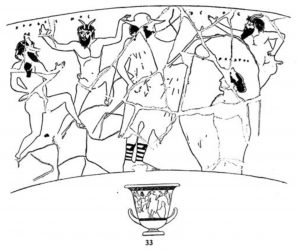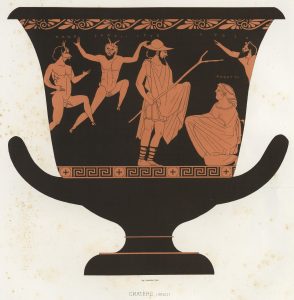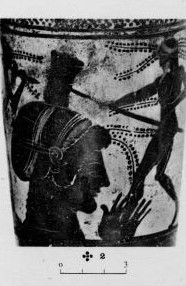Chapter 2: The Olympians
Previous Page Table of Contents Next Page
♦ Dresden, Albertinum 350: Attic red-figure calyx krater with Persephone, Hermes and Silenoi

P. Herrmann, “Erwerbungen der Antikensammlungen in Deutschland,” Archäologischer Anzeiger 1892, 166 fig. 33

N. Des Vergers, L’Étrurie et les Étrusques: ou, Dix ans de fouilles dans les Maremmes toscanes, vol. 3 (1862-64), pl. 10
Beazley Archive Pottery Database
♦ Berlin, Antikensammlung 3275: Attic red-figure calyx krater with Persephone, Hermes and Silenoi

P. Hartwig, “Die Wiederkehr der Kora auf einem Vasenbilde aus Falerii,” Mittheilungen des Kaiserlich Deutschen Archaeologischen Instituts. Römische Abteilung 12 (1897), pls. 4-5
Beazley Archive Pottery Database
♦ Ferrara, Museo Nazionale di Spina 3031: Attic red-figure volute krater by the Painter of Bologna 279, with Persephone and Silenoi

Beazley Archive Pottery Database
♦ Stockholm, National Museum 6: Attic red-figure bell krater from the Polygnotos Group with Persephone and Silenoi

Annali dell’Instituto di Corrispondenza Archeologica 2 (1830), pl. K
Beazley Archive Pottery Database
♦ Paris, Cabinet des Medailles 298: Attic lekythos, Persephone and Silenoi


Corpus Vasorum Antiquorum. France 10: Paris, Bibliothèque Nationale (Cabinet des Médailles). Fascicule 2 (1931), pl. 85
Beazley Archive Pottery Database
♦ Oxford, Ashmolean Museum V525 (G275): Attic red-figure volute krater with Zeus, Hermes, Epimetheus, Pandora and Eros

Corpus Vasorum Antiquorum: Oxford, Ashmolean Museum. Fascicule I (1927), pl. 21

Percy Gardner, “A New Pandora Vase,” The Journal of Hellenic Studies 21 (1901), pl. 1
Beazley Archive Pottery Database
♠ Pausanias 8.25.4
After Thelpusa the Ladon descends to the sanctuary of Demeter in Onceium. The Thelpusians call the goddess Fury, and with them agrees Antimachus also, who wrote a poem about the expedition of the Argives against Thebes. His verse runs thus:—“There, they say, is the seat of Demeter Fury. Greek Text
♠ Kallimachos Hymn 6 to Demeter – Callimachus 2, pp. 35-40, ed. R. Pfeiffer. Oxford 1953.
♠ Hesiod, Ehoiai (Catalogue of Women) fr 43a1-11 MW – Fragmenta Hesiodea, pp. 27-31, ed. R. Merkelbach and M. L. West. Oxford 1967.
[. . .pre]tty-crowned Polymele. [Or like the daughter of] god[like Erysichthon . . .] of the [. . .] son of Triops, [Mestre of pretty locks,] who had the [s]parkles [of the Graces; and they called him Aithon by] n[a]m[e] because [a blazing, mighty] famine [. . . the tribes] of mortal humans [. . .] and all [. . . blazi]ng famine [. . . for m]ortal humans [. . .] kn[ow- . . . shre]wd counsel in their [h]earts [. . . of w]omen [. . .] (Transl. Silvio Curtis)
♠ Hellanikos 4F7 – Die Fragmente der griechischen Historiker 1, p. 109, ed. F. Jacoby, 2d ed. Leiden 1957.
♠ Palaiphatos 23 – Mythographi Graeci 2, pp. 31-32, ed. N. Festa. Leipzig 1902.
Mestra: About Mestra the daughter of Erysichthon, they say that whenever she wished she could change her shape. The myth is laughable. How likely is it that from a girl she could become a cow and again a dog or bird? The truth is thus: Erysichthon was a Thessalian man, who went through his money and became poor. He had a daughter, the good and beautiful Mestra. Whoever saw her was amorously disposed. People then did not get betrothed with silver coin but instead some gave horses, others cows, some sheep or whatever Mestra wanted. The Thessalians said, seeing the livelihood of Erysichthon piling up, “From Mestra came horse and cow and other things,” whence the myth developed. Greek Text
♠ Lykophron, Alexandra 1391-96
him who of old was utterly hated by the goddess Cyrita: the father of the crafty vixen who by daily traffic assuaged the raging hunger of her sire – even Aethon, plougher of alien shires. Greek Text
♠ Ovid, Metamorphoses 8.738-878
ERYSICHTHON AND MESTRA
Now Erysichthon’s daughter, Mestra, had
that power of Proteus—she was called the wife
of deft Autolycus.—Her father spurned
the majesty of all the Gods, and gave
no honor to their altars. It is said
he violated with an impious axe
the sacred grove of Ceres, and he cut
her trees with iron. Long-standing in her grove
there grew an ancient oak tree, spread so wide,
alone it seemed a standing forest; and
its trunk and branches held memorials,
as, fillets, tablets, garlands, witnessing
how many prayers the goddess Ceres granted.
And underneath it laughing Dryads loved
to whirl in festal dances, hand in hand,
encircling its enormous trunk, that thrice
five ells might measure; and to such a height
it towered over all the trees around,
as they were higher than the grass beneath.
But Erysichthon, heedless of all things,
ordered his slaves to fell the sacred oak,
and as they hesitated, in a rage
the wretch snatched from the hand of one an axe,
and said, “If this should be the only oak
loved by the goddess of this very grove,
or even were the goddess in this tree,
I’ll level to the ground its leafy head.”
So boasted he, and while he swung on high
his axe to strike a slanting blow, the oak
beloved of Ceres, uttered a deep groan
and shuddered. Instantly its dark green leaves
turned pale, and all its acorns lost their green,
and even its long branches drooped their arms.
But when his impious hand had struck the trunk,
and cut its bark, red blood poured from the wound,—
as when a weighty sacrificial bull
has fallen at the altar, streaming blood
spouts from his stricken neck. All were amazed.
And one of his attendants boldly tried
to stay his cruel axe, and hindered him;
but Erysichthon, fixing his stern eyes
upon him, said, “Let this, then, be the price
of all your pious worship!” So he turned
the poised axe from the tree, and clove his head
sheer from his body, and again began
to chop the hard oak. From the heart of it
these words were uttered; “Covered by the bark
of this oak tree I long have dwelt a Nymph,
beloved of Ceres, and before my death
it has been granted me to prophesy,
that I may die contented. Punishment
for this vile deed stands waiting at your side.”
No warning could avert his wicked arm.
Much weakened by his countless blows, the tree,
pulled down by straining ropes, gave way at last
and leveled with its weight uncounted trees
that grew around it. Terrified and shocked,
the sister-dryads, grieving for the grove
and what they lost, put on their sable robes
and hastened unto Ceres, whom they prayed,
might rightly punish Erysichthon’s crime;—
the lovely goddess granted their request,
and by the gracious movement of her head
she shook the fruitful, cultivated fields,
then heavy with the harvest; and she planned
an unexampled punishment deserved,
and not beyond his miserable crimes—
the grisly bane of famine; but because
it is not in the scope of Destiny,
that two such deities should ever meet
as Ceres and gaunt Famine,—calling forth
from mountain-wilds a rustic Oread,
the goddess Ceres, said to her, “There is
an ice-bound wilderness of barren soil
in utmost Scythia, desolate and bare
of trees and corn, where Torpid-Frost, White-Death
and Palsy and Gaunt-Famine, hold their haunts;
go there now, and command that Famine flit
from there; and let her gnawing-essence pierce
the entrails of this sacrilegious wretch,
and there be hidden—Let her vanquish me
and overcome the utmost power of food.
Heed not misgivings of the journey’s length,
for you will guide my dragon-bridled car
through lofty ether.” Continue Latin Text
Previous Page Table of Contents Next Page
Tags:
#Epimetheus, #Eros, #Hermes, #Pandora, #Persephone, #Silenoi, #Zeus
Artistic sources edited by R. Ross Holloway, Elisha Benjamin Andrews Professor Emeritus, Joukowsky Institute for Archaeology and the Ancient World, Brown Univ., and Frances Van Keuren, Prof. Emerita, Lamar Dodd School of Art, Univ. of Georgia, April 2018.
Literary sources edited by Elena Bianchelli, Senior Lecturer of Classical Languages and Culture, Univ. of Georgia, August 2020
1,285 total views, 1 views today